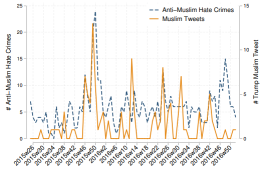Making America hate again
 Yesterday, I explained how different scientific studies carry quite different meaning, because of different underlying knowledge, different questions being tested, different experimental set-up. So consider a sociology study (cite) from the University of Warwick, that takes a variety of statistical looks at how Trump’s tweets on Islam relate to anti-Muslim hate crimes in the US. The only reason it makes sense even to do such a study is that we already know there is a strong streak of Islamophobia in US, that it both affects politics and generates hate crimes, and that Trump builds his campaign to appeal to it. Without that, this would just be an exercise in looking for spurious correlation. Because we already know that, there is the interesting question of whether and how communication from their leader affects the behavior of Trump supporters who are Islamophobic.
Yesterday, I explained how different scientific studies carry quite different meaning, because of different underlying knowledge, different questions being tested, different experimental set-up. So consider a sociology study (cite) from the University of Warwick, that takes a variety of statistical looks at how Trump’s tweets on Islam relate to anti-Muslim hate crimes in the US. The only reason it makes sense even to do such a study is that we already know there is a strong streak of Islamophobia in US, that it both affects politics and generates hate crimes, and that Trump builds his campaign to appeal to it. Without that, this would just be an exercise in looking for spurious correlation. Because we already know that, there is the interesting question of whether and how communication from their leader affects the behavior of Trump supporters who are Islamophobic.
It might be that his tweets incite his followers’ Islamophobia, causing them to commit more hate crimes. It might be that they serve as a cathartic valve, that given the comfort of a leader who expresses their animosity they don’t need to act themselves. It might be neither. So it’s worth taking a look at the data and seeing what is there. Given the nature of what’s being studied, the fact that the data is entirely observational, and that external events affect both Trump’s tweets and his followers behavior, that statistical relationship only goes so far:
While highly suggestive, a major limitation of this research is that it is correlational not causal. In order to prove that Trump’s tweets truly caused an increase in hate crimes, the researchers would need to run a carefully controlled experiment showing that exposure to such messages leads people to act out in hateful ways. This research also does not prove that Trump’s tweets cause people to hold prejudicial views towards Muslims. In fact, the researchers themselves do not seem to believe this. Instead, they point out that their findings are consistent with the idea that Trump’s presidency has made it more socially acceptable for many people to express prejudicial or hateful views that they already possessed prior to his election.
Some conservatives will hate this research. But they should ask themselves why? Those doing it understand its limits. In the case of Scientific American, the reporter understands its limits. I suspect what they really hate isn’t the research itself, but some of the underlying knowledge that raises the question. They would just as soon pretend that there is no Islamophobia in the US, and that Trump doesn’t campaign on it.
